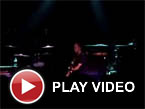Mary Lattimore & Jeff Zeigler, "Slant of Light"
 This is an unusual duo with an unusual pedigree, as Zeigler is a Philadelphia engineer best known for working with artists like Kurt Vile and The War on Drugs, while Lattimore is a harpist who has worked with all kinds of interesting folks in the past, ranging from Jarvis Cocker to Wrekmeister Harmonies.  Together, they create something that would have been perfectly at home on 2013's fascinating I Am The Center compilation…almost.  While Lattimore's rippling harp weaves a gently hallucinatory and dreamlike spell that veers close to both New Age and chamber music at times, Zeigler's well-placed guitar and synth coloration gives these four pieces a welcome heft and unpredictability.  Admittedly, the balance between pastoral and avant garde is not always quite optimal, but this is nevertheless a strong and distinctive debut.
This is an unusual duo with an unusual pedigree, as Zeigler is a Philadelphia engineer best known for working with artists like Kurt Vile and The War on Drugs, while Lattimore is a harpist who has worked with all kinds of interesting folks in the past, ranging from Jarvis Cocker to Wrekmeister Harmonies.  Together, they create something that would have been perfectly at home on 2013's fascinating I Am The Center compilation…almost.  While Lattimore's rippling harp weaves a gently hallucinatory and dreamlike spell that veers close to both New Age and chamber music at times, Zeigler's well-placed guitar and synth coloration gives these four pieces a welcome heft and unpredictability.  Admittedly, the balance between pastoral and avant garde is not always quite optimal, but this is nevertheless a strong and distinctive debut.
Slant of Light opens with the lovely, harp-driven "Welsh Corgis in the Snow," which unfolds a gently melancholy melody of plucked arpeggios.  Zeigler, for his part, sticks to something of a background role for "Corgis," but handles it beautifully, embellishing Lattimore's rippling harp with woozy, shimmering swells of synth or heavily treated guitar.  On the following "White Balloon," however, it is Jeff who steers the piece with a neo-classical sounding arpeggio progression of his own, though Lattimore's plucked melody organically weaves in and out of it nicely.  At times it verges a bit too close to "pastoral" for my taste, but Zeigler narrowly keeps things from becoming too polite with a subtle backdrop of electronic noise and whooshing atmospherics.
The album's second half leads off with "Echo Sounder," the first piece that sounds like it actually began collaboratively, as its bleary, gently warped ambience unfolds in a languorously meandering fashion that strongly suggests improvisation.  I hesitate to use the word "purposeless" to describe it, as that would sound too negative, but it is the sort of piece that just pleasantly hangs in the air and quavers pleasantly rather than sets off towards a planned destination.  While it lacks much of the melody or momentum that carried the album's first half, its hazy, twinkling reverie is very likable in its own right.
The closing "Tomorrow is a Million" is similarly divergent from Slant’s more composed opening pieces, though it takes things in a much more unpredictable and experimental direction than I had anticipated. It begins innocently enough, though Lattimore's rapidly plucked arpeggios are a bit darker and more unstable-sounding than they were previously.  Zeigler, however, is quite intent on dragging the piece into far deeper, stranger waters, gradually escalating from ghostly whines, scrapes, and echoing noises to a scary, noisy industrial-sounding crescendo.  It is certainly not nearly as easy on the ears as the rest of the album, nor is it entirely successful, but it is nevertheless Slant of Light's most compelling and unique piece as well as its most convincing raison d’être.  Rather than sounding like either a Mary Lattimore piece or collaborative improvisation, "Tomorrow" sounds like a Mary Lattimore piece that has been torn and stretched into something bizarre and largely unrecognizable.  That is an unexpected and impressive achievement, though the sped-up early Tangerine Dream-style synth at the end sounds a bit deranged and misplaced.
It is difficult to say whether Slant of Light has any real flaws, as it feels like Mary and Jeff had fairly modest ambitions for this effort and delivered a uniformly likable batch of songs: for the most part, this sounds exactly like two kindred spirits getting together to make some enjoyable and interesting music.  I suppose there is a lack of a clear, unified vision and "Tomorrow" hints at a potentially more adventurous, unusual, and significant album that could have been, but such things take time.  I need to have more reasonable expectations for debut albums, I guess–for all its minor quirks and unevenness, Slant of Light is still dramatically better and more instantly gratifying than most instrumental efforts that cross my path.
 



